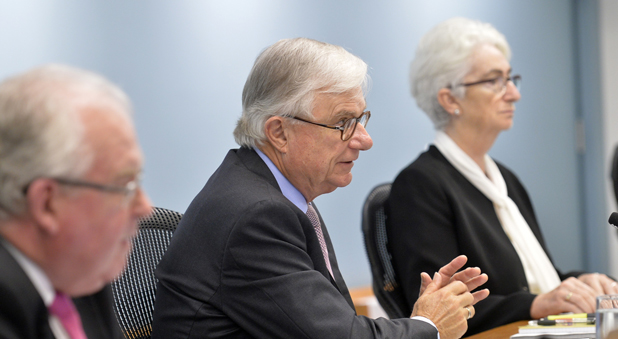The Royal Commission into Institutional Responses to Child Sexual Abuse has finished its investigation of the Anglican Church, with a summary hearing in Sydney that revealed some statistics on offences against children.
The commission set aside four days for its hearing into issues such as the structure of the church, training and formation, professional standards and redress.
Throughout its term, the chair of the commission Justice Peter McClellan and his fellow commissioners (pictured above) have struggled to come to terms with the diverse nature and governance of the Anglican Church nationally.
Counsel assisting the commission, Gail Furness, SC, tabled a set of statistics on abuse within the Anglican Church. Overall, 1082 complainants alleged incidents of child sexual abuse, and these were reported to the 23 dioceses across Australia, covering the years 1980 to 2015.
The Diocese of Brisbane received the highest number of complaints – 371, or 33 per cent of all complaints. But the commission stressed that the Brisbane figures, unlike other areas, included complaints about Anglican schools that were handled centrally by the diocese. The Diocese of Adelaide received the second highest number of complaints – 155 cases or 14 per cent, of which a significant number related to the Church of England Boys’ Society (CEBS). Melbourne had 96 complaints (9 per cent) followed by 89 (8 per cent) for Sydney and 63 (6 per cent) in Newcastle.
The total number of perpetrators nationally was 569, of whom 43 per cent were ordained clergy and 50 per cent were lay people. Other statistics quoted by the commission were that three-quarters of those abused were male and one-quarter female, with the abuse starting at an average age of 11 years for both sexes.
The data showed that, on average, the time between the alleged incidents and reporting was 29 years. However, an earlier study of abuse in Anglican churches found that the reporting gap for female victims was shorter, sometimes within a month of the incident and more likely before the age of 20.
The Primate, Archbishop Philip Freier, told reporters, “Anglicans have been truly shocked and dismayed at the unfolding in the Royal Commission of the scope of our failure to tackle child sexual abuse within the Church, and the depth of survivors’ pain and suffering. We are deeply ashamed of the many ways in which we have let down survivors, both in the way we have acted and the way we have failed to act.”
He said the findings of the commission had been eagerly awaited. “The Anglican Church of Australia apologised for its failures in 2004. Since then, the Church has invested a great deal of energy in seeking to understand the nature and cause of our failings. We have improved in many areas, but we are striving still and welcome guidance and assistance.
“There is a pronounced appetite for change inside the Anglican Church. We are determined to apply best practice so that the Church is a truly safe place for children.”
The head of Moore College’s Centre for Ministry Development, the Rev Archie Poulos, along with the Rev Andrew Ford – Anglicare’s general manager of mission and partnerships – and the director of the Professional Standards Unit, Lachlan Bryant, all participated in panels on their areas of expertise during the hearing.
Archbishop Glenn Davies, who was a member of the panel on the final day, said the issue of forgiveness was important in considering the past approach to abuse cases. He said forgiveness is corrupted when there is no restitution or true repentance. “I think what has happened in the past is that there has been easy forgiveness or should I say cheap forgiveness whereby a person has been forgiven, thinking it was not going to happen again. We were not aware of recidivism as an issue - we too easily forgave. I think at heart people almost didn't believe that such behaviour could be engaged in within a church environment….there was actually a disbelief in regard to that. That's why we didn't listen properly to children and when complaints were made they were not properly addressed and I've spoken publicly about that and given an apology with regard to that and I think those are the causes or part of the causes that have allowed this horrific abuse of young people to occur in previous decades.”






















